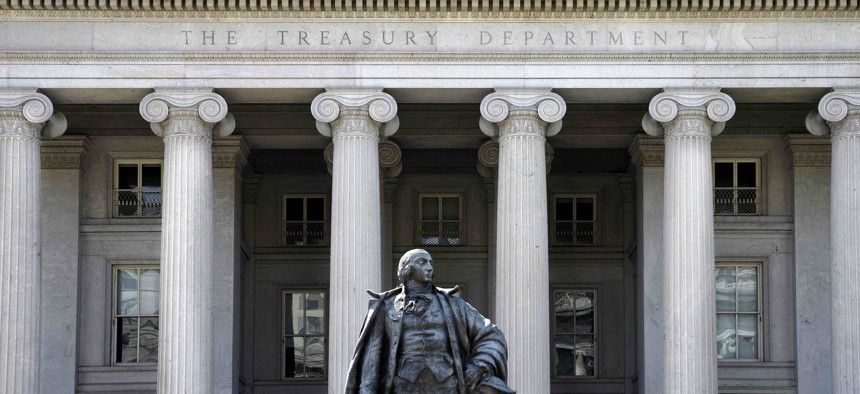Treasury Shuts Down Helpline for States and Localities

A statue of Albert Gallatin, a former U.S. Secretary of the Treasury, stands in front of The Treasury Building in Washington, D.C. Robert Alexander/Getty Images
Due to a funding crunch left unaddressed by Congress, the department is phasing out phone and email services to field questions about billions in pandemic aid.
The Treasury Department is drastically cutting back the support services it offered to state and local governments for handling various pandemic-related programs.
On Monday, the department shut down a call center that provided state and local assistance and it will be sharply curtailing its email response operations at the end of the month, because Congress did not pass a bill to continue funding for the efforts. The call center fielded about 300 inquiries a week, and the email team has been responding to about 2,000 questions a week, according to a Treasury official.
Local leaders will likely be frustrated with the cutbacks, as they try to follow the rules that Congress and the Treasury Department set for the recovery money, said Irma Esparza Diggs, the senior executive and director of federal advocacy for the National League of Cities.
Mayors and other city officials are trying to use the money to ease the economic strains on cities and their residents, she said.
“Businesses are still struggling. Commercial districts are still struggling. Their residents are struggling to make mortgage and rent payments,” Esparza Diggs said.
“Being able to pick up the phone or being able to send an email [as a city official] to know you’re on the right track with reporting and compliance requirements is the last piece of this puzzle,” she said. “To not have the agency that is distributing the funds as the first go-to partner is worrisome for a lot of communities, particularly those who have never managed federal grants before.”
The call center and email operation were especially important to smaller governments. Even many of the municipalities that did routinely receive federal funding previously, worked with agencies other than the Treasury Department.
More than 30,000 units of government qualified for help in one of the programs created by the 2021 American Rescue Plan Act. The support operations helped governments answer questions about funding from:
- the Coronavirus State and Local Fiscal Recovery Funds (SLFRF)
- the Coronavirus Capital Projects Fund
- the Emergency Rental Assistance Program
- the Homeowner Assistance Fund and
- the Local Assistance and Tribal Consistency Fund.
Questions directed to Treasury about the aid dollars ranged from complex inquiries about what projects would be eligible for funding under which programs, to more routine matters of how to change the contact person for local governments to handle communications with the department.
The cuts to the Treasury budget will also prevent the department’s officials from reaching out proactively to local governments, and it will reduce its capacity to monitor recipients and conduct compliance testing of reporting data, the Treasury official said.
The Treasury Department posted 19 pages of answers to frequently asked questions, so local governments could work through common concerns after the call center closed.
Groups that represent local government, like the National League of Cities and the National Association of Counties, have also been helping their members get answers to questions about the funding and reporting process.
The Treasury Department warned recipients in September that the cuts were imminent if Congress did not intervene. Lawmakers last month passed a continuing resolution to keep the government running through Dec. 16, but they did not include the fix Treasury sought.
A proposal to reallocate money that is currently dedicated to other Treasury functions, so it could be spent on the support for local governments, passed the U.S. Senate unanimously but has not passed the House. Advocates hope they can include the change in a must-pass funding bill in December
Esparza Diggs said she was hopeful Congress would include the spending authority in the next few months.
If city officials discover that phone and email support is no longer available from Treasury, she said, “their next call after Treasury will be to call their member of Congress and say, ‘I need someone from Treasury to respond to this.’”
Daniel C. Vock is a senior reporter for Route Fifty based in Washington, D.C.
NEXT STORY: A Leading Republican Looks to Get Tough on the SALT Deduction






